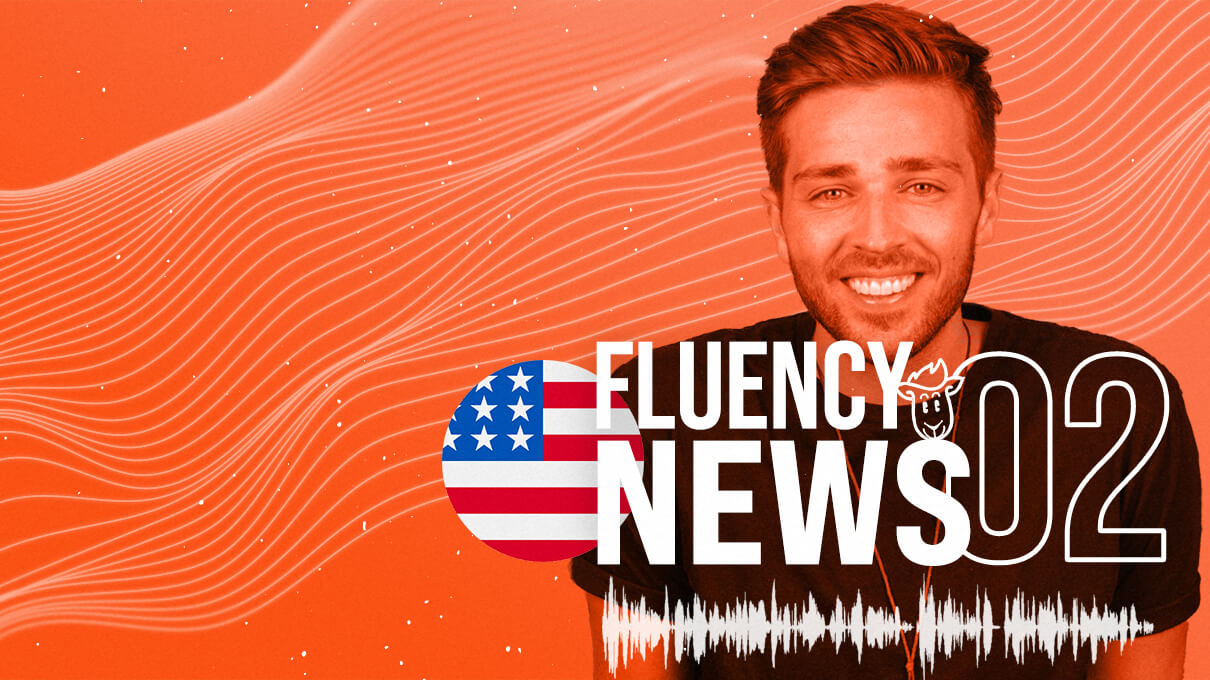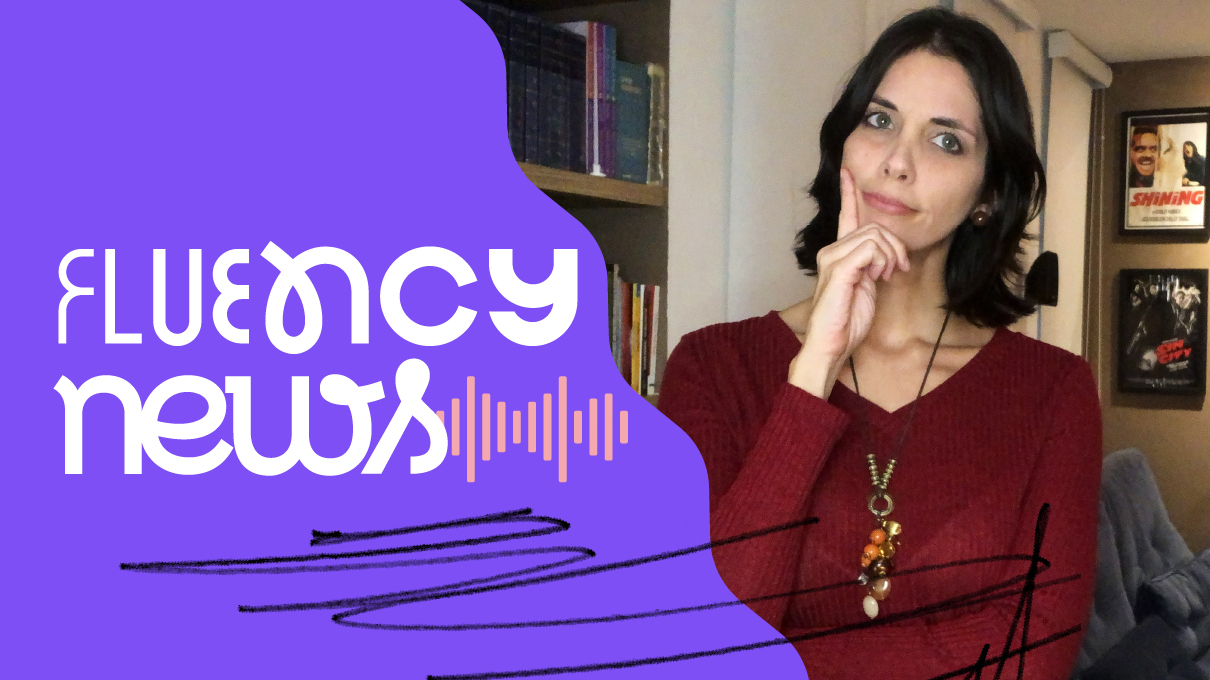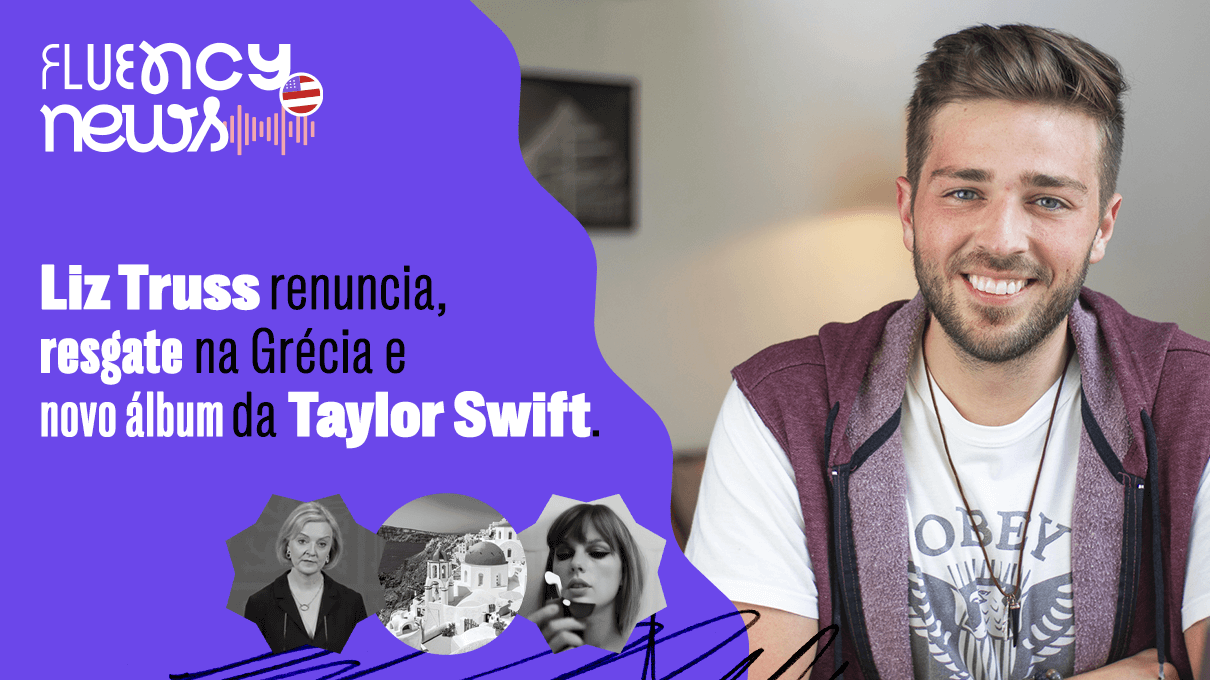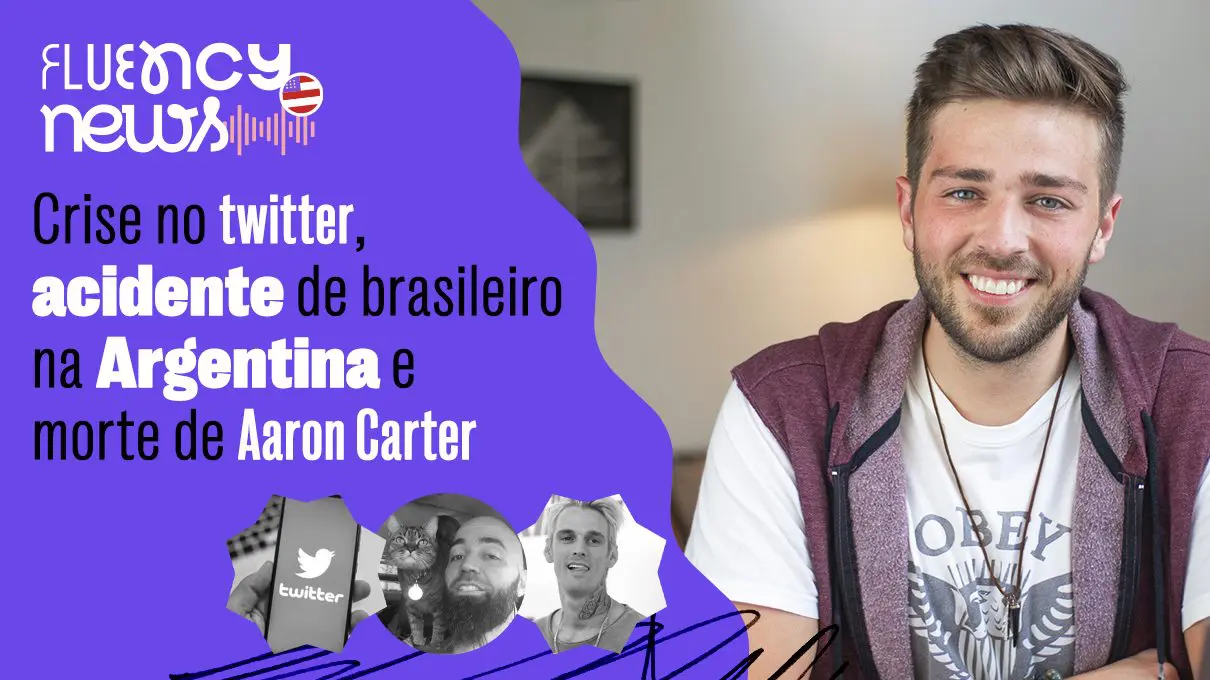Fluency News: Book banning leads to banned books book clubs

Sejam bem-vindos e bem-vindas a mais um episódio da nossa série de podcasts, o Fluency News!
Navegue pelo conteúdo
Hello, everyone!
Sejam bem-vindos e bem-vindas a mais um episódio da nossa série de podcasts, o Fluency News! Aqui você vai treinar a sua escuta e ficar por dentro do que está acontecendo no mundo, sempre com as principais notícias da semana, tudo em inglês! Ao longo do episódio, nós também adicionamos explicações em português das coisas que achamos que precisam de mais atenção, assim você não perde nenhum detalhe!
No episódio desta semana, damos uma olhada no que aconteceu recentemente na Ucrânia, e vemos os efeitos devastadores da mudança climática na África do Sul. Nós também falamos sobre os avanços na tecnologia de energia solar, e sobre os estudantes que estão se juntando para ler livros que estão sendo banidos nos Estados Unidos.
Nós temos uma página de dicas de inglês no Instagram, vá conferir! @fluencytvingles
Toda semana, temos um novo episódio do Fluency News, não deixe de escutar! See you!
Transcrição do episódio
What is up, everyone! Welcome back to Fluency News, Fluency Academy’s news-based podcast! Here at Fluency News you have the chance to work on your comprehension and listening skills, while becoming informed of all that’s happening around the world.
We select three to four stories each episode, some of the most important of the week, all around the world. We share them with you all in English, and then we work on some different, unique or more complicated structures we might see, in Portuguese. I’m Scott Lowe, and thank you for joining me today!
Before we jump right into the news, let me just remind you you can also work on your reading skills by going to fluency.io and reading the transcript of this episode. If you want to challenge yourself and really focus on your listening skills, though, I recommend you listen to this episode without reading, and then go back with the transcript. That way you’ll make the most out of this time here with me.
Now, let’s jump in! The future of solar energy has just gotten brighter with this device for converting stored energy into electricity.
Solar-powered electronics are one step closer to becoming an everyday part of our lives thanks to a “radical” new scientific breakthrough.
In 2017, scientists at a Swedish university created an energy system that makes it possible to capture and store solar energy for up to 18 years, releasing it as heat when needed.
Now the researchers have succeeded in getting the system to produce electricity by connecting it to a thermoelectric generator. Though still in its early stages, the concept developed at Chalmers University of Technology in Gothenberg could pave the way for self-charging electronics that use stored solar energy on demand.
“This is a radically new way of generating electricity from solar energy. It means that we can use solar energy to produce electricity regardless of weather, time of day, season, or geographical location,” explains research leader Kasper Moth-Poulsen, Professor at the Department of Chemistry and Chemical Engineering at Chalmers.
The device could potentially replace batteries and solar cells, fine-tuning the way we use the sun’s abundant energy.
Fine-tune é um verbo que pode ser traduzido para “afinar”, mas o seu uso é bem mais amplo. Nós usamos esse verbo quando estamos falando de pequenas ações que tomamos para melhorar algo, de ajustes feitos para que algo chegue a um nível próximo da perfeição. É o equivalente do “dar os retoques finais”, em português.
As always, we’ve added all of our sources to the description of this episode, and you’ll be able to read more in depth if you wish to do so. We always try to bring updates to any relevant stories, so make sure to check back next week to be up to date!
Now, South African authorities said that at least 443 people have now died due to the flooding and mudslides that followed heavy storms in the KwaZulu-Natal province.
KwaZulu-Natal premier Sihle Zikalala said at a news conference that 63 residents are still unaccounted for, calling the disaster among the worst the province has ever seen.
The storms and flooding has left thousands of residents homeless, knocked out power and water services, and delayed operations at Durban, the country’s busiest port.
KwaZulu-Natal residents told Reuters about still being terrified of the thought of more rain falling on the region, and said they are losing hope of finding relatives in the aftermath of the disaster.
Africa’s southeastern coast is expected to be hit hard by climate change, with more extreme storms and flooding expected in the decades ahead.
Nessa notícia, nós temos um fenômeno que pode causar um pouco de confusão em quem está aprendendo inglês ou se familiarizando com o idioma. That é uma palavrinha com muitos significados e usos. Aqui, nós podemos ver o uso dela quando introduzimos uma frase relativa, que explica o que é o objeto do verbo principal. O que pode causar algum estranhamento, é que em algumas frases that pode ser omitido. Alguns verbos, principalmente alguns dos mais usados, dispensam o that da frase relativa. “Say”, “think”, “tell”, “hear” e “believe”, por exemplo, não exigem essa partícula na frase que se segue.
Se você não souber ou não tiver certeza se pode omitir ou não, use-o! Mas continue lendo e tentando perceber quais deles usam ou não, para poder reproduzir estes padrões. A decisão de usar ou não o that seria mais instintiva do que gramatical, no fim das contas.
Now, an update to the Ukrainian invasion we’ve been covering since late February. Images have emerged, apparently showing the Russian cruiser Moskva shortly before the ship sank in the Black Sea.
In the photos and video, which have not been independently confirmed, a plume of black smoke is seen rising from the heavily damaged vessel, which was reported to have been hit by a Ukrainian missile strike last week.
The images show that the ship’s lifeboats have been deployed and there are no sailors visible on deck, suggesting the ship may have been abandoned.
The Russian defense ministry has released very little information about how the ship sank, claiming the damage to the boat was sustained in an accident on board. The Ukrainian government, along with western intelligence officials, say that the ship was hit by several Ukrainian anti-ship missiles.
The Russian government also has not confirmed any information about the number of casualties from the incident.
While the absence of lifeboats would suggest a considerable number of the crew could have been rescued, other reports suggest that up to 200 sailors might’ve been wounded in the attack on the ship. The ship was reported to have around 500 crew on board.
Ukrainian President Volodymyr Zelenskyy promoted Ukraine’s top naval commander in what officials suggested was a reward for sinking the flagship of Russia’s Black Sea Fleet. It was the largest warship lost since WWII.
Oleksiy Neizhpapa was elevated from the rank of Rear Admiral to Vice Admiral on April 16, according to a decree on Zelenskyy’s website.
It did not give a reason for the promotion. But Victoria Strakhova, an adviser in Zelenskyy’s administration, said in a Facebook post that “everybody knows” the “lightning operation” that prompted the move.
In another show of the Ukrainian tenacity, Ukrainian troops liberated two towns in the Kharkiv region and advanced in two more.
Oleh Syniehubov, head of the Kharkiv Military Administration, said that the defenders in the region were carrying out several successful operations.
“The other day, a Separate Airmobile Brigade near Kharkiv destroyed 5 Russian tanks and 10 armored vehicles by jet fire. About a hundred occupiers will never be able to attack again,” Syniehubov said.
A palavra may, como muitas outras no inglês, tem mais de um significado e uso. Ela frequentemente dá a ideia de “poder”, ter a possibilidade de fazer algo. Ela é um semi-modal, que muitas vezes pode ser trocado pro “might” ou “can”, dependendo do sentido. Na frase, I may go to the party, may significa “pode ser que”, e pode ser substituído por “might”. Já na frase “may I be excused?”, may tem o mesmo uso de “can”, para fazer um pedido educado. Nessa história, na frase “the ship may have been abandoned”, o semi-modal tem o sentido de “talvez”, “pode ser que”, e assim, pode ser substituído por “might”.
And finally, on today’s episode, book banning efforts are inspiring readers to form banned book clubs.
When Joslyn Diffenbaugh learned about efforts in Texas to remove certain books from school libraries and classrooms, she was inspired to join forces with the local Firefly Bookstore and start the Banned Book Club.
The 14-year-old said she had read several of the books in question. Among the titles that had come under attack recently were “The Hate U Give,” a novel about a young Black girl who grapples with racism and police brutality, and “All American Boys,” a novel about two teenagers — one Black and one White — who contend with similar issues.
Those books exposed Diffenbaugh to realities that she might not otherwise have encountered. That some parents and politicians were trying to limit other young people’s understanding of such issues as racism was concerning to her.
“The reason these books are being banned are the reasons why they should probably be read,” the 14-year-old said she was thinking at the time.
The community is one of several banned book clubs that have formed in response to a growing push from the right to control what titles young people have access to. And it points to an ironic effect: The more certain books are singled out, the more people want to read them.
Book banning — or at least, book banning attempts — appears to be having a resurgence. In recent months, conservative local and state officials have taken aim both at specific titles and broad categories of books that deal with race, gender or sexuality. And while attempts to remove those books from library shelves or classrooms haven’t all been successful, the efforts themselves have garnered interest in banned books from readers across the country.
For some banned book clubs, recent book banning attempts have been a springboard for wider discussions about censorship.
Teenagers at the Common Ground Teen Center in Washington, Pennsylvania, formed a banned book club soon after a Tennessee school district voted to remove “Maus” from an eighth grade curriculum. But while the graphic novel about the Holocaust was the catalyst for the club, says director Mary Jo Podgurski, the first title they chose to read was, fittingly, “Fahrenheit 451” — the 1953 dystopian novel about government censorship that itself has been challenged over the years.
“Obviously this whole idea of taking away books that they wanted to read or that they thought they should read sparked a nerve in them,” said Podgurski.
Lizzy Brison, a member of the club at the Common Ground Teen Center, said she understands why some books might merit extra care and caution when it comes to younger readers. But she feels removing them from shelves is a step too far.
“They’re protecting what they think is innocence, but in reality, they’re just limiting children to what they can access with their own identity,” Brison, who is in 10th grade, said. “It’s gonna be uncomfortable to help a child through that process. But it’s going to be worth it in the end because your child will end up knowing who they are and where they belong in the world.”
Algumas palavras em inglês são escritas da mesma forma, mas pronunciadas de maneiras diferentes. T-E-A-R, por exemplo, pode ser tear, lágrima, ou tear, rasgo. Read, que aparece nessa notícia, também é uma dessas palavras. Escrita R-E-A-D, pode ser o presente do verbo ler, read, ou o passado, leu, read. Outro exemplo é a palavra L-I-V-E, que pode ser live, de morar, ou live, de ao vivo. Se você quiser saber mais sobre outras palavrinhas assim, eu recomendo escutar o episódio 08 do nosso podcast Pronunciation Bootcamp. Lá você vai aprender mais desses casos com a teacher Becs.
And this is where we’re going to end today’s episode, folks! Remember to check out fluency.io to see all of our sources and have access to the transcript of this episode.
E se você quer melhorar o seu nível de qualquer um dos idiomas que ensinamos – inglês, espanhol, francês, italiano, alemão, japonês, mandarim ou coreano – aprendendo com os professores da FluencyTV, você pode se inscrever na nossa lista de espera.
Assim quando a gente abrir uma nova turma você vai ter uma chance ainda melhor de conseguir uma vaga! É só se inscrever clicando no link na descrição desse episódio.
Leva uns 15 segundinhos e vale super a pena! Assim você não arrisca perder a próxima turma e ficar meses esperando uma nova chance!
There’s a new episode of Fluency News every week, and we’ll be waiting for you! See you soon! Peace.
Stories
The Ukrainian Invasion
https://www.theguardian.com/world/ukraine
https://www.businessinsider.com/zelenskyy-promotes-ukraine-navy-leader-moskva-russia-flagship-sank-2022-4
https://www.businessinsider.com/talking-to-putin-waste-time-says-italian-pm-mario-draghi-2022-4
https://www.pravda.com.ua/eng/news/2022/04/17/7340296/
https://www.theguardian.com/world/2022/apr/18/film-and-photos-appear-to-show-russian-cruiser-moskva-shortly-before-it-sank
https://www.businessinsider.com/putin-time-is-not-now-ceasefire-ukraine-italian-pm-draghi-2022-4
https://www.ukrinform.net/rubric-ato/3460627-culture-ministry-200-cultural-heritage-sites-destroyed-by-russian-invaders.html
https://www.theguardian.com/world/2022/apr/18/film-and-photos-appear-to-show-russian-cruiser-moskva-shortly-before-it-sank
Death toll reaches 443 amid flooding, mudslides in South Africa
https://thehill.com/policy/international/africa/3271349-death-toll-reaches-443-amid-flooding-mudslides-in-south-africa/
https://www.reuters.com/world/africa/rescuers-hunt-missing-after-south-african-floods-kill-more-than-400-2022-04-17/
https://www.aljazeera.com/news/2022/4/18/south-africa-flood-toll-rises-to-443-dozens-still-missing
https://www.theguardian.com/world/2022/apr/16/south-africa-flood-ravaged-east-more-heavy-rain
https://www.theguardian.com/world/2022/apr/16/south-africa-flooding-death-toll-nears-400-as-rescuers-search-for-missing
Solar energy can now be stored for up to 18 years, say scientists
https://www.euronews.com/green/2022/04/12/solar-energy-can-now-be-stored-for-up-to-18-years-say-scientists
Book banning efforts are inspiring readers to form banned book clubs
https://edition.cnn.com/2022/04/15/us/banned-book-clubs-cec/index.html
Playlist







































































































 Curso de Inglês
Curso de Inglês
 Curso de Espanhol
Curso de Espanhol
 Curso de Francês
Curso de Francês
 Curso de Mandarim
Curso de Mandarim
 Curso de Italiano
Curso de Italiano
 Curso de Japonês
Curso de Japonês
 Curso de Alemão
Curso de Alemão
 Curso de Coreano
Curso de Coreano







 Blog
Blog  Podcast
Podcast  Lives
Lives  Aulas
Aulas  eBooks
eBooks  Minicursos
Minicursos














